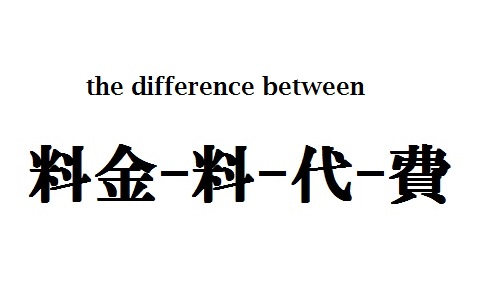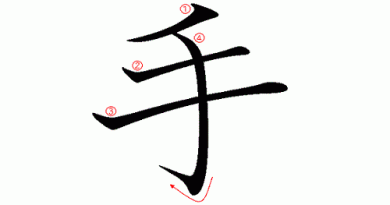The differences between 料金, 料, 代 and 費

Hello everyone, in this article, Learn Japanese Daily would like to introduce you types of expenses in Japanese. That’s how to tell the differences between 料金, 料, 代 and 費. These are rather similar words that can confuse you to no end. Even though they all are used to refer to expenditure, their usages are different. Let’s learn figure it out together.
Contents
Differences between 料金, 料, 代 and 費
1. 「料金」(‘ryōkin‘)
Means costs: Is usually used in daily life (spent on services).
For example,
電話料金 (Denwa ryōkin) – Phone cost
通話料金(tsūwa ryōkin) – Calling cost
電気料金 (denki ryōkin) – Electricity cost
水道料金 (suidō ryōkin) – Cost of water
ガス料金 (gasu ryōkin) – Cost of gas
高速料金 (kōsoku ryōkin) – Toll charge
通行料金 (tsūkō ryōkin) – Toll
駐車料金 (chūsha ryōkin) – Parking fee
郵便料金 (yūbin ryōkin) – Postal fee
入浴料金 (nyūyoku ryōkin) – An entrance fee to enter a public bathroom
基本料金 (kihon ryōkin) – Basic fee
インタアネット利用料金 ( intaanetto riyōryōkin) – Internet fee
Differences between 料金, 料, 代 and費
2. 「料」(‘ryō‘)
Used a lot in organizations, fees are based on regulations.
For examp,
授業料 (Jugyō ryō) – Tuition fee
受講料 (jukō ryō) – Course fee
手数料 (tesūryō) – Commission fee
原稿料 (genkō ryō) – Manuscript fee
サービス料 (sābisu ryō) – Royalties
送料 (sōryō) – Delivery fee
返送料 (hensō ryō) – Redelivery fee
使用料 (shiyō ryō) – Usage fee
受信料 (jushinryō) – TV fee
入学検定料 (nyūgaku kentei ryō) – Enrollment fee
入場料 (nyūjō ryō) – Entrance fee
着陸料 (chakuriku ryō) – Landing fee
加入権料 (kanyū ken ryō) – Registration fee when you want to participate in a competition
入院料 (nyūin ryō) – Hospital admission rate
通行料 (tsūkō ryō) – Toll rate
車検料 (shaken ryō) – Accreditation fee
Differences between 料金, 料, 代 and 費
3. 「代」 (‘dai‘)
This is your money, personal expenditure.
For example,
食事代 (Shokuji dai) – Cost of the meal
飲み代 (nomidai) – Cost of the drinks
本代 (hondai) – Money spent on books
床屋代 (tokoya dai) – Money spent on haircuts
タバコ代 (tabako dai) – Money spent on cigarettes
バス代 (basu dai) – Bus fare
車代 (kurumadai) – Car fare
バイト代 (baito dai) – Data fee
電気代 (denki dai) – Electricty fee
ガス代 (gasu dai) – Gas fee
洗濯代 (sentaku dai) – Laundry fee
資料代 (shiryō dai) – Money spent to receive information
引越し代 (hikkoshi dai) – Moving-out fee
Differences between 料金, 料, 代 and費
4. 「費」 (‘hi‘)
Fares such as traffic charge… (paid beforehand)
For example,
参加費 (Sanka hi) – Participation fee
人件費 ( jinken hi) – Labour cost
事業費 (jigyō hi) – Project cost
社会保障費 (shakai hoshō hi) – Social security cost
義務教育費 (gimu kyōiku hi) – Compulsory education cost
会費 (kaihi) – Membership fee
学費 (gakuhi) – Tuition fee
食費 (shokuhi) – The expense incurred for food
管理費 (kanrihi) – Management fee
事務費 (jimu hi) – Office expenditure
医療費 (iryō hi) – Medical expenses
入院費 (nyūin hi) – Hospital admission fee ….など
Differences between 料金, 料, 代 and費
5. 「賃」(‘chin‘)
Expenses for renting labour/things
For example
家賃 (Yachin) – House rental
工賃 (kōchin) – Wages
手間賃 (temachin) – Temporary workers’ wages
運賃 (unchin) – Carriage fee
Differences between 料金, 料, 代 và 費
6.「金」 (‘kin‘)
Potential costs, play as a contribution to activities.
For example :
保証金 (Hoshō kin) – Security deposit
礼金 (reikin) – Gratitude money
敷金 (shikikin) – Security deposit
入学金 (nyūgaku kin) – Enrollment fee
奨学金 (shōgaku kin) – Scholarship
入会金 (nyūkai kin) – Membership admission fee
見舞金 (mimai kin) – A consolatory present of money (to a sufferer)
義捐金 (gien kin) – A collection of contributions
頭金 (atamakin) – A down payment
手付金 (tetsuke kin) – A deposit (for sellers)
賃金 (chingin) – Wages
お祝い金 (oiwai kin) – A gift of money
交付金 (kōfu kin) – Grants
賠償金 (baishō kin) – Compensation for damages
弔慰金 (chōi kin) – Condolence-money
補助金 (hojokin) – Welfare
委託金 (itaku kin) – Commission fee
Differences between 料金, 料, 代 and 費
7.「税」 (‘zei‘) – Tax
For example,
相続税 (Sōzoku zei) – Inheritance tax
贈与税 (zōyo zei) – Donation tax
所得税 (shotoku zei) – Income tax
消費税 (shōhi zei) – Consumption tax
Above are some ways to tell the differences between 料金, 料, 代 and 費 in Japanese. Hopefully, this knowledge will be helpful to you. Check out other similar articles in section: Japanese vocabulary.
reference : hoc tieng Nhat


